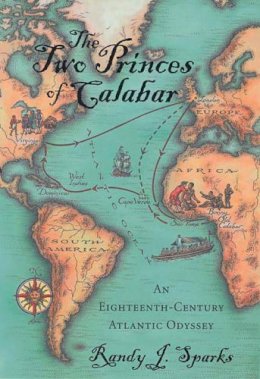
Stock image for illustration purposes only - book cover, edition or condition may vary.
The Two Princes of Calabar: An Eighteenth-Century Atlantic Odyssey
Randy J. Sparks
€ 35.27
FREE Delivery in Ireland
Description for The Two Princes of Calabar: An Eighteenth-Century Atlantic Odyssey
Paperback. In 1767, two 'princes' of a ruling family in the port of Old Calabar, on the slave coast of Africa, were ambushed and captured by English slavers. The princes were themselves slave traders who were betrayed by African competitors - and so began their own odyssey of enslavement. This book presents an account of the Atlantic slave experience. Num Pages: 208 pages, 2 maps. BIC Classification: 1H; 3JF; HBTS. Category: (G) General (US: Trade). Dimension: 202 x 127 x 15. Weight in Grams: 230.
Read more
In 1767, two “princes” of a ruling family in the port of Old Calabar, on the slave coast of Africa, were ambushed and captured by English slavers. The princes, Little Ephraim Robin John and Ancona Robin Robin John, were themselves slave traders who were betrayed by African competitors—and so began their own extraordinary odyssey of enslavement. Their story, written in...
Product Details
Publisher
Harvard University Press United States
Number of pages
208
Format
Paperback
Publication date
2009
Condition
New
Number of Pages
208
Place of Publication
Cambridge, Mass, United States
ISBN
9780674032057
SKU
V9780674032057
Shipping Time
Usually ships in 15 to 20 working days
Ref
99-14
About Randy J. Sparks
Randy J. Sparks is Professor of History at Tulane University.
Reviews for The Two Princes of Calabar: An Eighteenth-Century Atlantic Odyssey
In his brief, informative and wide-ranging account, Mr. Sparks uses the two princes’ capture and release as a prism through which to view the religion, commerce, literature and roguery of the time, on both sides of the ocean. It helps to be reminded that nothing in the past is quite so simple—so black and white—as moralists might like it to...
Read more